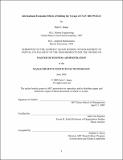International economic effects of halting the voyage of CSAV RIO PUELO
Author(s)
Jones, Eric C. (Eric Cooper)
DownloadFull printable version (664.3Kb)
Other Contributors
Sloan School of Management.
Advisor
John Van Maanen.
Terms of use
Metadata
Show full item recordAbstract
On July 31, 2004, the United States Coast Guard stopped the container ship CSAV RIO PUELO off of the Port of New York and New Jersey. The intervention occurred after the United States Department of Agriculture received information that an on board container of Argentine lemons carried a "harmful biological substance." The ship was held at anchor for six days as officials tested containers and weighed options of how to best prevent the release of a hazardous substance. Although the information which triggered the government response later proved to be a hoax, the economic damage to particular businesses was quite real. This thesis explores the broad range of costs - direct, indirect and intangible - incurred by businesses up and down supply chains within the shipping industry. Because the United States government may seek to recover its incident response costs, these intervention expenses have been included as well. The costs reported here were obtained by interviewing representatives of the businesses and government agencies involved in the incident. The case provides decision makers in both business and government a detailed example of the economic costs (real and potential) of Homeland Security interventions leading, presumably, to more informed policy and practice.
Description
Thesis (M.B.A.)--Massachusetts Institute of Technology, Sloan School of Management, 2005. This electronic version was submitted by the student author. The certified thesis is available in the Institute Archives and Special Collections. Includes bibliographical references (p. 89-92).
Date issued
2005Department
Sloan School of ManagementPublisher
Massachusetts Institute of Technology
Keywords
Sloan School of Management.